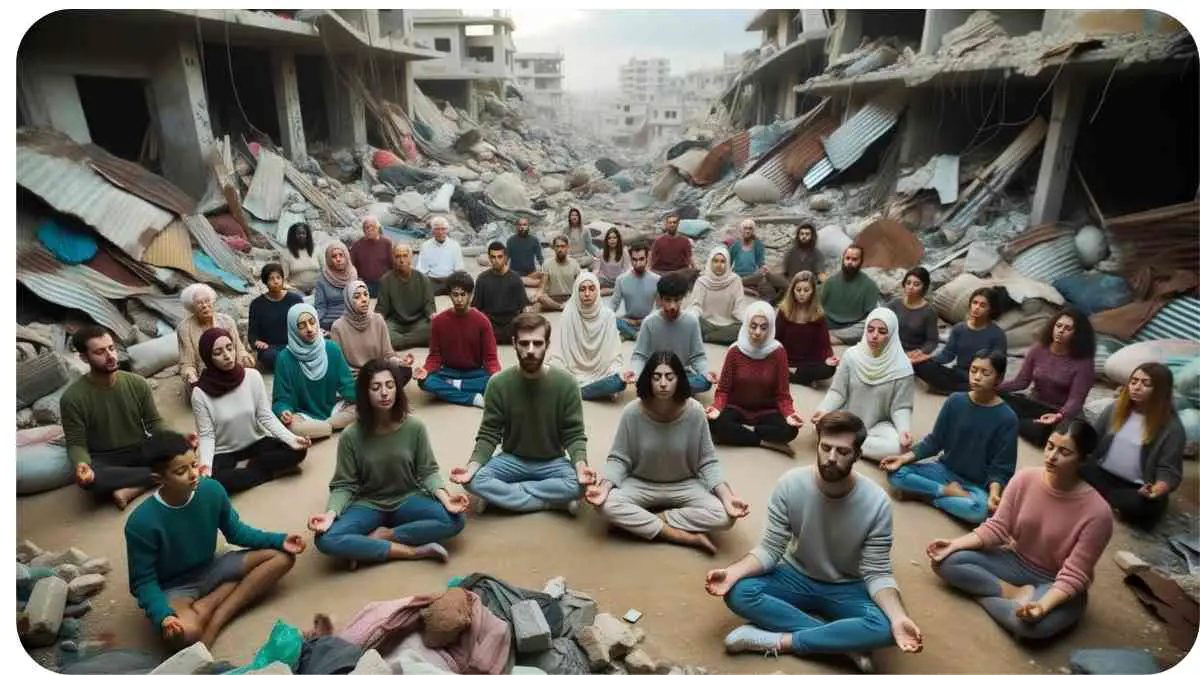The reverberations of war go beyond the battlefield, infiltrating the minds and hearts of those living amidst the chaos. The 2023 Gaza War, a dark chapter in the annals of history, showcases the indelible impact of conflict on mental health. Understanding this impact and the importance of mental wellness is the first step toward nurturing a resilient spirit in the face of adversity.
| Takeaways |
|---|
| 1. Understanding the profound impact of war on mental health is the cornerstone of fostering resilience. |
| 2. Coping mechanisms like mindfulness, exercise, and social support are vital in nurturing mental wellness amidst chaos. |
| 3. Establishing a routine, practicing gratitude, and embracing positivity can provide a semblance of normalcy and hope. |
| 4. Community support and professional help are crucial resources in the journey towards mental wellness. |
| 5. Leveraging both traditional methods like art therapy and modern technology like mindfulness apps can be beneficial. |
| 6. The pursuit of mental wellness during war is a personal, ongoing endeavor that requires patience, persistence, and self-compassion. |
| 7. Resources like books, online courses, and support groups can provide valuable knowledge and support. |
| 8. Despite the external chaos, every individual has the potential to find a sanctuary of inner peace with the right strategies and support. |
| 9. Exploring personal narratives and real-world examples can provide insight and inspiration on navigating mental wellness during war. |
| 10. Continuous learning, self-reflection, and adaptation are key to maintaining mental wellness amidst evolving adversities. |
Understanding the Impact of War
War is a calamity that shatters communities, disrupts lives, and leaves a lasting imprint on the mental well-being of individuals. The daily life in Gaza, filled with uncertainties and fears, is a testament to the human spirit’s ability to endure. Yet, the psychological wounds inflicted are often deep and long-lasting, necessitating a proactive approach to mental health.
In today’s fast-paced world, it’s easy to become overwhelmed with daily stressors. Yet, by taking just a few minutes each day, one can harness the power of mindfulness to manage stress and bring a sense of calm to even the most chaotic situations.
The Importance of Mental Wellness
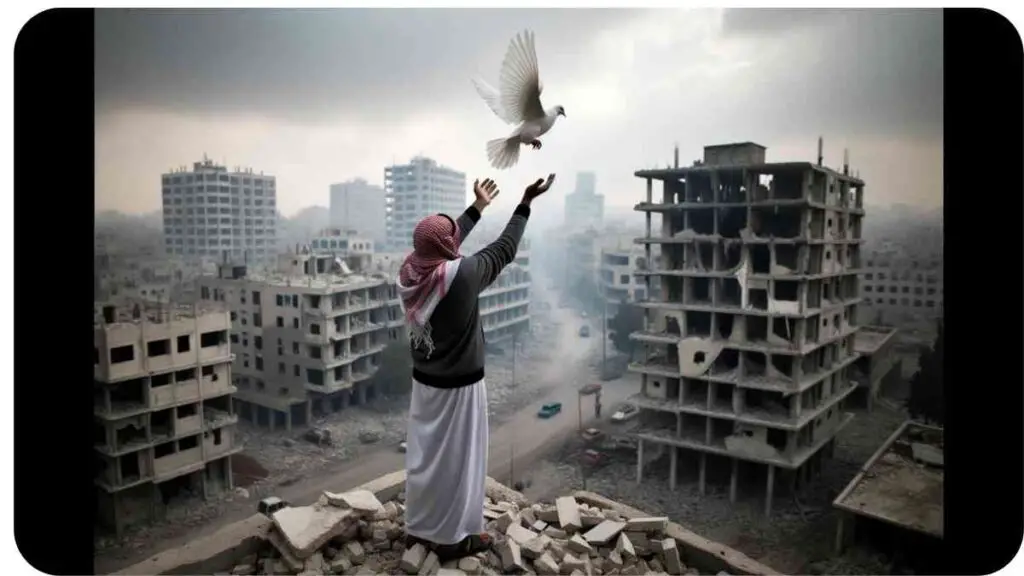
Mental wellness is not merely the absence of mental disorders. It’s about cultivating a state of well-being, where individuals realize their own potential, work productively, and contribute to their communities, even in the direst of circumstances.
The Reality of War in Gaza
The Gaza Strip has been a focal point of conflict for decades, with the 2023 escalation marking a grim milestone in its turbulent history. To grasp the psychological toll, a brief historical overview is essential.
Historical Context
| Year | Event | Brief Description |
| 1948 | Arab-Israeli War | Establishment of Israel, beginning of Palestinian exodus |
| 1967 | Six-Day War | Israel captures Gaza Strip |
| 2007 | Hamas Takes Control | Political division leading to blockade |
| 2008 | Gaza War | Three-week armed conflict |
| 2012 | Operation Pillar of Defense | Eight-day operation |
| 2014 | Operation Protective Edge | Seven-week operation |
| 2023 | The 2023 Escalation | Ongoing conflict |
Understanding the historical context of the Gaza Strip provides a backdrop against which the mental health challenges faced by its residents can be better appreciated.
Traumatic experiences can leave lasting scars on our psyche. However, there are tools available that can help individuals navigate these challenges. By understanding and implementing the power of mindfulness in combating trauma and PTSD, one can begin the journey to healing and find peace amidst the storm.
The 2023 Escalation
The eruption of violence in 2023 has added a new layer of distress for the people of Gaza. The continual bombardment, loss of loved ones, and the destruction of homes and infrastructure create an environment of persistent stress and fear.
The Psychological Toll
The ongoing war in Gaza has given rise to a plethora of mental health challenges for the individuals living through it. From anxiety and depression to post-traumatic stress disorder (PTSD), the psychological scars are often as deep as the physical ones.
Common Mental Health Issues
Living in a war zone can trigger or exacerbate a range of mental health issues. The most common among these include:
- Anxiety Disorders: The constant fear of danger can trigger anxiety disorders.
- Depression: Loss, grief, and chronic stress can lead to depression.
- Post-Traumatic Stress Disorder (PTSD): Witnessing or experiencing traumatic events can cause PTSD.
- Sleep Disorders: The stress and anxiety can lead to sleep disorders like insomnia.
Coping Mechanisms
Having robust coping mechanisms can be a beacon of hope in the gloom of war. Here’s a table highlighting various coping mechanisms and their benefits:
| Coping Mechanism | Benefits |
| Mindfulness | Helps in reducing anxiety and improving mood. |
| Exercise | Boosts mood, reduces stress, and improves sleep. |
| Social Support | Provides emotional support and a sense of belonging. |
| Professional Therapy | Addresses and treats underlying mental health issues. |
| Art and Expression | Provides an outlet for emotions and reduces stress. |
| Routine | Creates a sense of normalcy and control amidst chaos. |
Building Resilience
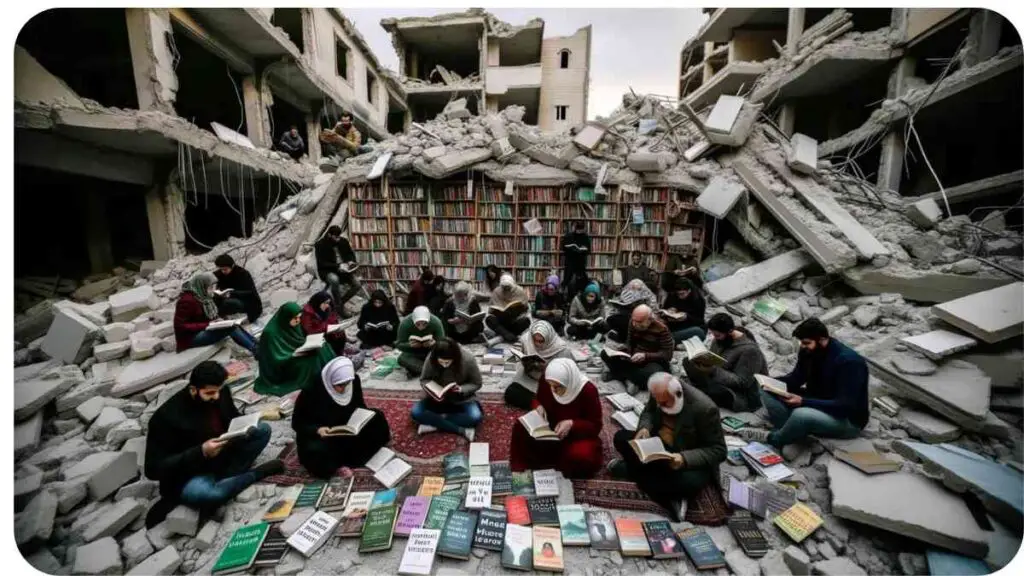
The ability to bounce back from adversity is a hallmark of resilience. In the face of war, nurturing resilience can be a lifeline.
Mental health is a crucial aspect of our overall well-being. As life presents its myriad challenges, it becomes essential to have strategies in place. With 10 mindfulness techniques to help improve your mental health, one can equip themselves with the skills needed to face adversities head-on.
Understanding Resilience
Resilience is not about avoiding stress but learning to thrive within it. It’s about developing a set of skills that can help individuals bounce back from adversity.
Strategies for Building Resilience
Various strategies can help in nurturing resilience. Here’s a table outlining some strategies along with examples:
| Strategy | Examples |
| Mindfulness | Practicing meditation and breathing exercises. |
| Social Connections | Building strong, positive relationships with loved ones. |
| Positive Thinking | Cultivating an optimistic outlook, even in tough situations. |
| Problem-Solving | Developing the ability to solve problems and make decisions. |
| Professional Help | Seeking therapy to work through challenges. |
Mindfulness and Meditation
In the storm of war, finding a calm center can be transformative. Mindfulness and meditation are tools that can help individuals navigate through the turmoil with a semblance of peace.
Anxiety and stress are common feelings in today’s society. While these emotions can be overwhelming, they don’t have to control our lives. By understanding why mindfulness is the key to reducing stress and anxiety, individuals can take proactive steps towards achieving a balanced and harmonious life.
The Power of Now
Living in the present moment, or the “now,” can be a powerful antidote to the stress and anxiety caused by ongoing conflict. Mindfulness practices help in anchoring individuals to the present, alleviating the incessant worries about the future or the regrets of the past.
Techniques for Mindfulness and Meditation
There are various techniques that can aid in practicing mindfulness and meditation. Below is a table illustrating some techniques along with their benefits:
| Technique | Benefits |
| Breath Awareness | Helps in reducing anxiety and promoting relaxation. |
| Body Scan | Promotes awareness of bodily sensations and relaxation. |
| Loving-Kindness | Cultivates a sense of compassion and love towards oneself and others. |
| Guided Meditation | Provides structured meditation experiences led by an instructor. |
Practicing these techniques regularly can foster a sense of peace and mental clarity amidst the chaos of war, providing a refuge for the troubled mind.
Community Support
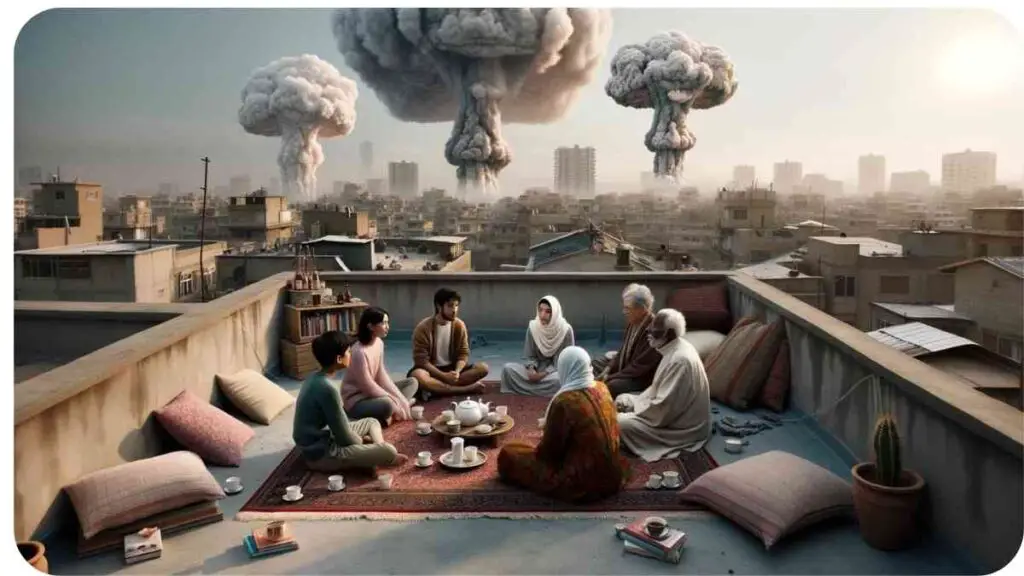
Navigating through the harrowing experience of war is a burden too heavy for one to bear alone. The camaraderie and support of a community can provide a bedrock of stability and understanding during such tumultuous times.
Finding Your Tribe
In times of crisis, having a network of supportive individuals can be a lifeline. Whether it’s family, friends, or community groups, surrounding oneself with people who understand and empathize with the struggle can provide immense emotional relief.
Local and Online Support Groups
In this digital age, support is available both offline and online. Here’s a table listing some support groups and platforms where individuals can find solace and share their experiences:
| Support Group/Platform | Description |
| Local Community Centers | Places where individuals can gather for support and discussions. |
| Online Forums | Platforms for sharing experiences and seeking advice anonymously. |
| Social Media Groups | Closed groups on platforms like Facebook for mutual support. |
| Therapy Groups | Professionally moderated groups for discussing shared challenges. |
Professional Help
The war in Gaza can trigger or exacerbate mental health issues necessitating professional intervention. Seeking help from qualified mental health professionals can provide coping strategies and therapeutic solutions.
In the pursuit of success and happiness, it’s easy to neglect one’s well-being. However, it’s essential to remember that taking care of oneself is paramount. By embracing the teachings of mindfulness and self-care for your mind and body, one can ensure a life filled with joy, contentment, and good health.
When to Seek Professional Help
It’s crucial to recognize when professional help is needed. Persistent feelings of despair, chronic anxiety, or any other symptoms that interfere with daily life warrant a consultation with a mental health professional.
Finding a Good Therapist
Various forms of therapy can be beneficial. Below is a table depicting types of therapies and their benefits:
| Type of Therapy | Benefits |
| Cognitive-Behavioral | Helps in identifying and correcting distorted thought patterns. |
| Psychoanalytic | Aims at exploring unconscious thoughts and childhood experiences. |
| Humanistic | Focuses on personal growth and self-actualization. |
| Group Therapy | Provides support through shared experiences in a group setting. |
Healthy Habits
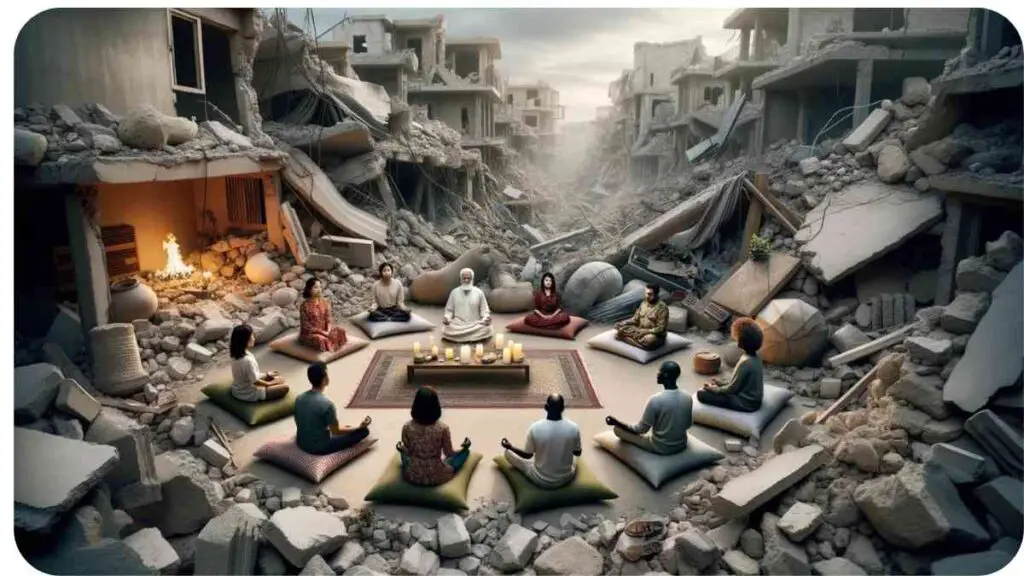
Amidst the chaos, maintaining a semblance of routine and adhering to healthy habits can provide a sense of normalcy and control.
Nutrition and Exercise
A balanced diet and regular exercise are pillars of not just physical, but mental health as well. They help in managing stress, improving mood, and enhancing overall well-being.
Sleep Hygiene
Sleep is crucial for mental health. Below is a table with tips for better sleep:
| Tips for Better Sleep | Description |
| Keep a Regular Schedule | Going to bed and waking up at the same time every day. |
| Create a Bedtime Ritual | Establishing relaxing pre-sleep rituals like reading or meditating. |
| Avoid Stimulants | Avoiding caffeine and nicotine close to bedtime. |
| Make Your Bedroom Comfortable | Ensuring a comfortable sleep environment. |
Educational Resources
Knowledge is empowering. Understanding the psychological impact of war and learning coping strategies can be a significant step towards mental wellness.
Books and Articles
Reading reputable books and articles can provide insights into managing mental health during conflict.
Online Courses and Workshops
Various platforms offer courses and workshops on mental health, resilience, and coping strategies. Below is a table listing some recommended resources:
| Resource | Description |
| Coursera | Online platform offering courses on mental health. |
| Udemy | Platform for learning coping strategies through online courses. |
| Local Workshops | Workshops conducted by mental health professionals in the community. |
Creating a Routine
In a world disrupted by war, clinging to a routine can be a pillar of stability. Establishing a daily routine can help in bringing a sense of normalcy amidst the abnormal, providing a framework that fosters mental wellness.
The Importance of a Routine
Routine provides a structure to our day, reduces the number of decisions we have to make, and creates a flow that can be comforting. In times of uncertainty, having a routine can provide predictability, which can be reassuring.
Tips for Establishing a Routine
Establishing a routine might feel challenging amidst chaos, but it’s possible with some planning. Below is a table with a sample routine that could be adapted to individual circumstances:
| Time | Activity | Description |
| 6:00 am | Wake Up | Start the day at a consistent time. |
| 6:30 am | Exercise | A session of yoga, stretching, or a workout. |
| 7:30 am | Breakfast | A nutritious meal to start the day. |
| 8:00 am | Mindfulness Practice | Meditation or breathing exercises for mental clarity. |
| 12:00 pm | Lunch | Another nutritious meal. |
| 6:00 pm | Social Interaction | Connecting with loved ones or support groups. |
| 8:00 pm | Relaxation | Reading, drawing, or any relaxing activity. |
| 10:00 pm | Sleep | Ensuring a good night’s sleep for mental and physical recovery. |
Embracing Positivity
In the face of adversity, nurturing a positive outlook can be a beacon of hope. By finding hope and practicing gratitude, individuals can foster a positive mindset that propels them through challenging times.
Finding Hope
Hope can be found in the smallest of things, whether it’s the smile of a loved one, the warmth of a sunny day, or the joy in a child’s laughter. Seeking and acknowledging these moments of joy can be uplifting.
Practice Gratitude
Practicing gratitude can shift the focus from what’s wrong to what’s right. Below is a table with a daily gratitude exercise:
| Gratitude Exercise | Description |
| Morning Reflection | Start the day by listing three things you are grateful for. |
| Evening Reflection | End the day by acknowledging three good things that happened. |
Art and Expression
Art can be a powerful tool for expression and healing. It provides an outlet for emotions, allowing individuals to process their experiences in a therapeutic manner.
The Therapeutic Value of Art
Art therapy has been recognized for its potential to heal and empower. It provides a non-verbal medium to explore and express emotions, which can be particularly beneficial in processing trauma.
Getting Started with Art Therapy
Engaging in art therapy doesn’t require professional skills. Below is a table with some art therapy exercises:
| Art Therapy Exercise | Description |
| Drawing | Draw your emotions or experiences. |
| Painting | Paint your hopes or fears. |
| Sculpting | Create a sculpture representing your current emotional state. |
Relaxation Techniques
Amidst the turmoil, relaxation techniques can provide a much-needed respite for the mind and body.
Breathing Exercises
Breathing exercises are simple yet effective in reducing stress and promoting relaxation.
Yoga and Tai Chi
These ancient practices promote relaxation and inner peace. Below is a table with some relaxation techniques and their benefits:
| Relaxation Technique | Benefits |
| Deep Breathing | Reduces stress, promotes relaxation. |
| Yoga | Enhances flexibility, reduces stress, promotes mental clarity. |
| Tai Chi | Promotes relaxation, enhances balance and coordination. |
Technology for Mental Wellness
Technology can be a double-edged sword. While it can be a source of stress, it can also be a tool for promoting mental wellness when used wisely.
Apps for Mindfulness and Relaxation
Various apps offer guided meditations, breathing exercises, and tools for mindfulness. Below is a table listing some of these apps:
| App Name | Description |
| Headspace | Offers guided meditation and mindfulness practices. |
| Calm | Provides meditation exercises and sleep stories for relaxation. |
| MyLife Meditation | Features mindfulness exercises and emotional check-ins. |
Virtual Therapy Options
Online therapy platforms have made it easier to seek professional help from the comfort of home, which is crucial in times of war when mobility can be restricted.
Conclusion
The relentless unrest in Gaza has put mental wellness in jeopardy for countless individuals. However, amidst the chaos, there lies a realm of resilience and hope. It’s a realm where the mind can find peace and clarity amidst the direst of situations. This journey towards mental wellness amidst war is not a sprint but a marathon, requiring patience, persistence, and a lot of self-compassion.
Recap and Final Thoughts
We delved into the reality of the Gaza war and its psychological toll, explored various coping mechanisms, and highlighted the importance of community support and professional help. Through mindfulness, routine, embracing positivity, and leveraging both traditional and technological resources, individuals can foster a semblance of mental wellness even in the throes of war.
The road to mental wellness during such trying times is undeniably challenging, yet with the right tools, resources, and support, it’s a journey that can lead to a sanctuary of inner peace amidst the external chaos. The battle may rage on outside, but with resilience, support, and a positive mindset, the turmoil can be kept at bay, allowing for a peaceful mind.
The pursuit of mental wellness is a personal and ongoing endeavor. It’s about finding what works for an individual, be it mindfulness practices, art therapy, or a strong support network. In the face of adversity, the human spirit’s capability to adapt and find peace is nothing short of remarkable.
In conclusion, the road to mental wellness amidst the Gaza war is paved with self-compassion, resilience, community support, and a plethora of resources aimed at nurturing the mind. The war may bring chaos, but within every individual lies a sanctuary of peace awaiting discovery.
Further Reading
CNN: Mental Health Wellness Amidst Israel-Hamas Conflict
Delve into a detailed account of how the ongoing conflict is impacting mental health in the region, and the various efforts being undertaken to promote mental wellness amidst the tumult.
UN News: Mental Health Crisis in Gaza
This article sheds light on the United Nations’ perspective regarding the mental health crisis unfolding in Gaza due to the ongoing conflict, and the humanitarian efforts being made to alleviate the psychological distress.
Al Jazeera: ‘My Voice is Our Lifeline’: A Gaza Journalist’s Experience Amid Israel Bombing
Explore the personal narrative of a journalist in Gaza, navigating fatherhood and his profession amidst the aerial bombardments, shedding light on the psychological toll and the resilience of individuals living through the war.
FAQs
How can one achieve mental wellness during the Gaza war?
Achieving mental wellness during the Gaza war entails a combination of personal, community, and professional efforts. This includes practicing mindfulness, maintaining a routine, seeking professional therapy, and leveraging support from community and support groups.
What strategies are highlighted in the guide for building resilience during the war?
The guide emphasizes the importance of mindfulness, establishing a routine, embracing positivity, and engaging in therapeutic activities like art and expression. It also underscores the role of community support and professional help in building resilience.
How does the guide suggest using technology for mental wellness?
The guide suggests utilizing technology by exploring apps for mindfulness and relaxation, and considering virtual therapy options. These technological resources can provide accessible support and tools for managing mental health amidst the war.
What resources are recommended for further learning and support?
The guide recommends reading reputable books and articles, enrolling in online courses and workshops, and engaging with local and online support groups. Additionally, the “Further Reading” section provides links to articles that delve deeper into the mental health implications of the Gaza war and personal narratives of individuals living through it.

Hello, my name is Hellen James! I am a yoga teacher and writer who loves to share information about how you can achieve a more fulfilling life. I have been practicing mindfulness, yoga, and meditation for over 10 years. My passion for these practices has led me to teach them to others.

